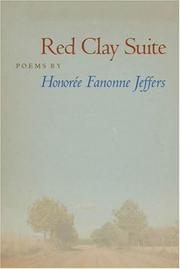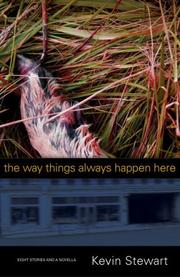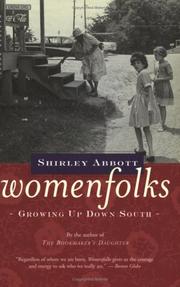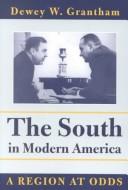| Listing 1 - 10 of 769 | << page >> |
Sort by
|

ISBN: 0809387581 1299050743 9780809387588 0809327600 9780809327607 Year: 2007 Publisher: Carbondale Crab Orchard Review :Southern Illinois University Press
Abstract | Keywords | Export | Availability | Bookmark
 Loading...
Loading...Choose an application
- Reference Manager
- EndNote
- RefWorks (Direct export to RefWorks)
In her third book of poems, Honorée Fanonne Jeffers expresses her familiarity with the actual and imaginary spaces that the American South occupies in our cultural lexicon. Her two earlier books of poetry, The Gospel of Barbecue and Outlandish Blues, use the blues poetic to explore notions of history and trauma. Now, in Red Clay Suite, Jeffersapproaches the southern landscape as utopia and dystopia-a crossroads of race, gender, and blood. These poems signal the ending movement of her crossroads blues and complete the last four "bars" of a blues song, resting on the final, and essential, note

ISBN: 1933202718 9781933202716 9781933202198 193320219X Year: 2007 Publisher: Morgantown [W. Va.] Vandalia Press
Abstract | Keywords | Export | Availability | Bookmark
 Loading...
Loading...Choose an application
- Reference Manager
- EndNote
- RefWorks (Direct export to RefWorks)
Book
Year: 2013 Publisher: [Place of publication not identified] : Project Gutenberg,
Abstract | Keywords | Export | Availability | Bookmark
 Loading...
Loading...Choose an application
- Reference Manager
- EndNote
- RefWorks (Direct export to RefWorks)
Monsieur Bourreau was the first to arrive, who had a conference with Sir Patricius Placebo, understanding that he was a medical gentleman. MONSIEUR BOURREAU.--"_Ah! serviteur, Monsieur._--_Mais je demand votre pardon! car je pourrois dire_, LE CHEVALIER _Aussi-bon_!" SIR PATRICIUS PLACEBO.--"Hem, hem! Placebo, _je dis_ Placebo!--_Prononces comme il faut, si vous plais, Monsieur Chirurgien!_" MONSIEUR BOURREAU.--"_Oh, pardon encore, je demand tres humblement de votre mains. Je dis, Chevalier Placebo, que les blesseurs portées de les fusils sont toujours trop dangereux; et pour moi, Chevalier Assebo, je prefere dix blesseurs de l'epée partout, à une diable blesseure de portée de fusil!--Mais, neanmoins, toujours chacun à son goût!_" SIR PATRICIUS.--"_Cette remarque, Monsieur Chirurgien, est trop vrai; et vous-avez sans doute beaucoup de raison certainment; car comme ils ont dit autrefois. Upon your art, Sir, and your faith to assist it, Shall I believe you, then, his wound's not mortal? LOVE'S PILGRIMAGE. The banditti who made the fierce and fiery attack, as recounted in our last chapter, a few days subsequent to that sad event were arrested by the _Gens d'Armes_ in Soignies wood. They had been composed, it appeared upon examination, of the daring and desperate of different nations, and that their leader was a Spaniard. But it is indeed full time that we should return to the mansion of Tyrconnel, where all was distress and dismay. But amid all this incidental confusion and alarm no time whatever had been lost in calling in surgical assistance; two surgeons of reputed eminence being instantly summoned--an English practitioner of the name of Leach, who long had been a resident at Brussels, and a Monsieur Bourreau, a French surgeon in considerable practice, likewise a resident of this ancient city, who immediately obeyed the summons.
Book
Year: 2013 Publisher: [Place of publication not identified] : Project Gutenberg,
Abstract | Keywords | Export | Availability | Bookmark
 Loading...
Loading...Choose an application
- Reference Manager
- EndNote
- RefWorks (Direct export to RefWorks)
Their route to the ford, which it had been determined they were to pass, lay through an unenclosed country, the grounds of which were partly covered with low brush-wood, over which the horses sprung with delight; and had the soldiers been clad in green a spectator might have imagined he looked down on a hunting party, instead of beholding Pg 3 an army upon the burst of battle; for, startled and roused from their peaceful lair, numerous rabbits and hares were seen to jump forth from beneath underwood, furze, fern, and heath; which soon set the soldiery at fault, and who for the moment gave up (tumultuously dashing into the merry greenwood) the hunting of men for chase of the leporine tribe; and they were not brought back to a sense of duty until thrice the bugle of recall had sounded; when having knocked on the head some hundreds of these peaceful, harmless animals, the troops gave up the chase, which is the symbol, for the dire reality of war ... James having ungenerously, as unjustly, thrown some reflections on the courage of his Irish troops, observing to some of his general officers, 'that he would never again trust his cause to an Irish army;' with much spirit they replied: 'That throughout the fight their troops had acted no inglorious part, though unanimated by a princely leader; that while William shared danger in common with his army, encouraging them with his presence, by his voice, and by his example, Pg 37yet that King James stood aloof at a secure distance, the quiet spectator of a contest on the result of which depended his crown and realms!'.
Book
ISBN: 168003068X 9781680030686 9781680030679 1680030671 Year: 2016 Publisher: Huntsville, Texas
Abstract | Keywords | Export | Availability | Bookmark
 Loading...
Loading...Choose an application
- Reference Manager
- EndNote
- RefWorks (Direct export to RefWorks)

ISBN: 1610756053 9781610756051 1682260232 9781682260234 0395901448 9780395901441 Year: 2017 Publisher: Fayetteville
Abstract | Keywords | Export | Availability | Bookmark
 Loading...
Loading...Choose an application
- Reference Manager
- EndNote
- RefWorks (Direct export to RefWorks)
Book
ISBN: 9798890849878 1469629690 1469629704 9781469629698 9781469629704 9781469629681 1469629682 Year: 2016 Publisher: Chapel Hill
Abstract | Keywords | Export | Availability | Bookmark
 Loading...
Loading...Choose an application
- Reference Manager
- EndNote
- RefWorks (Direct export to RefWorks)
Since the moment William Ferris's parents gave their twelve-year-old son a Kodak Brownie Hawkeye camera for Christmas in 1954, Ferris passionately began to photograph his world. He has never stopped. The sixties and seventies were a particularly significant period for Ferris as he became a pathbreaking documentarian of the American South. This beautiful, provocative collection of 100 of Ferris's photographs of the South, taken during this formative period, capture the power of his color photography. Color film, as Ferris points out in the book's introduction, was not commonly used by documentarians during the latter half of the twentieth century, but Ferris found color to work in significant ways in the photographic journals he created of his world in all its permutations and surprises. The volume opens with images of his family's farm and its workers--family and hired--southeast of Vicksburg, Mississippi. The images are at once lyrical and troubling. As Ferris continued to photograph people and their homes, churches, and blues clubs, their handmade signs and folk art, and the roads that wound through the region, divisive racial landscapes become part of the record. A foreword by Tom Rankin, professor of visual studies and former director of the Center for Documentary Studies at Duke University, provides rich insight into Ferris's work.
Book
ISBN: 0585288402 9780585288406 081730245X 0817302468 9780817302467 Year: 1985 Publisher: University, Ala. University of Alabama Press
Abstract | Keywords | Export | Availability | Bookmark
 Loading...
Loading...Choose an application
- Reference Manager
- EndNote
- RefWorks (Direct export to RefWorks)
In the middle of WWII, John Temple Graves, a syndicated columnist for the Birmingham Age-Herald, analyzed the South's eager support for England during the war's early days. He explored the South's military traditions, its poverty, and its allegiance to honor and duty.The Fighting South reveals as much about Graves as his region, and he apprears as a thoughtful yet loyal Southerner in the mold of Jonathan Daniels, Clarence Cason, Ralph McGill, and Wilbur Cash.
Southern States --- Civilization. --- History --- Southern states --- History.
Book
ISBN: 0817387773 9780817387778 9780817318451 0817318453 Year: 2014 Publisher: Tuscaloosa
Abstract | Keywords | Export | Availability | Bookmark
 Loading...
Loading...Choose an application
- Reference Manager
- EndNote
- RefWorks (Direct export to RefWorks)
Tell the World You're a Wildflower is a collection of loosely interwoven stories in the voices of southern women and girls of different ages and backgrounds. Beginning with the youngest characters and ending with the oldest, the stories encompass plastic surgery and white supremacists, family secrets and family trees, the United Daughters of the Confederacy and a young writer who describes her work in progress as "the bastard love-child of William Faulkner and Alice Walker."In Tell the World You're a Wildflower, each character must decide what to tell, whether to tell it, and to whom to tell i
Women --- Southern States

ISBN: 1610756452 9781610756457 1557287104 9781557287106 Year: 2001 Publisher: Fayetteville
Abstract | Keywords | Export | Availability | Bookmark
 Loading...
Loading...Choose an application
- Reference Manager
- EndNote
- RefWorks (Direct export to RefWorks)
| Listing 1 - 10 of 769 | << page >> |
Sort by
|

 Search
Search Feedback
Feedback About UniCat
About UniCat  Help
Help News
News